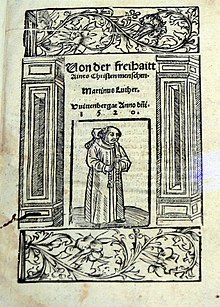On the Freedom of a Christian

On the Freedom of a Christian (Latin: "De Libertate Christiana"; German: "Von der Freiheit eines Christenmenschen"), sometimes also called A Treatise on Christian Liberty, was the third of Martin Luther’s major reforming treatises of 1520, appearing after his Address to the Christian Nobility of the German Nation (August 1520) and the work Prelude on the Babylonian Captivity of the Church (October 1520). The work appeared in a shorter German and a more elaborate Latin form. There is no academic consensus whether the German or the Latin version was written first.[1][2]
The treatise developed the concept that as fully forgiven children of God, Christians are no longer compelled to keep God's law to obtain salvation; however, they freely and willingly serve God and their neighbors. Luther also further develops the concept of justification by faith. In the treatise, Luther stated, "A Christian man is the most free lord of all, subject to none. A Christian man is most dutiful servant of all, and subject to everyone."[3]
See also
[edit]Notes
[edit]- ^ Reinhold Rieger: Von der Freiheit eines Christenmenschen, De libertate Christiana, Mohr Siebeck, Tübingen 2007, p. 5-12.
- ^ More detailed information regarding the question about the chronological order in which the German and the Latin version were created can be found in the following blog post: The German and Latin Versions of “On the Freedom of a Christian”.
- ^ Albrecht Beutel, "Luther's Life," tr. Katharina Gustavs, in The Cambridge Companion to Martin Luther, ed. Donald K. McKim (New York: Cambridge University Press, 2003), 11.
External links
[edit]- Online Edition in the Internet Modern History Sourcebook
- Modern scholarly Edition of the original German text (Creative Commons licensed)
- English Translation of the longer Latin text.
- On the Freedom of a Christian (English translation of the original German text with a commentary) in the Taylor Editions: Reformation Pamphlet Series, November 2020.
 Concerning Christian Liberty public domain audiobook at LibriVox
Concerning Christian Liberty public domain audiobook at LibriVox
